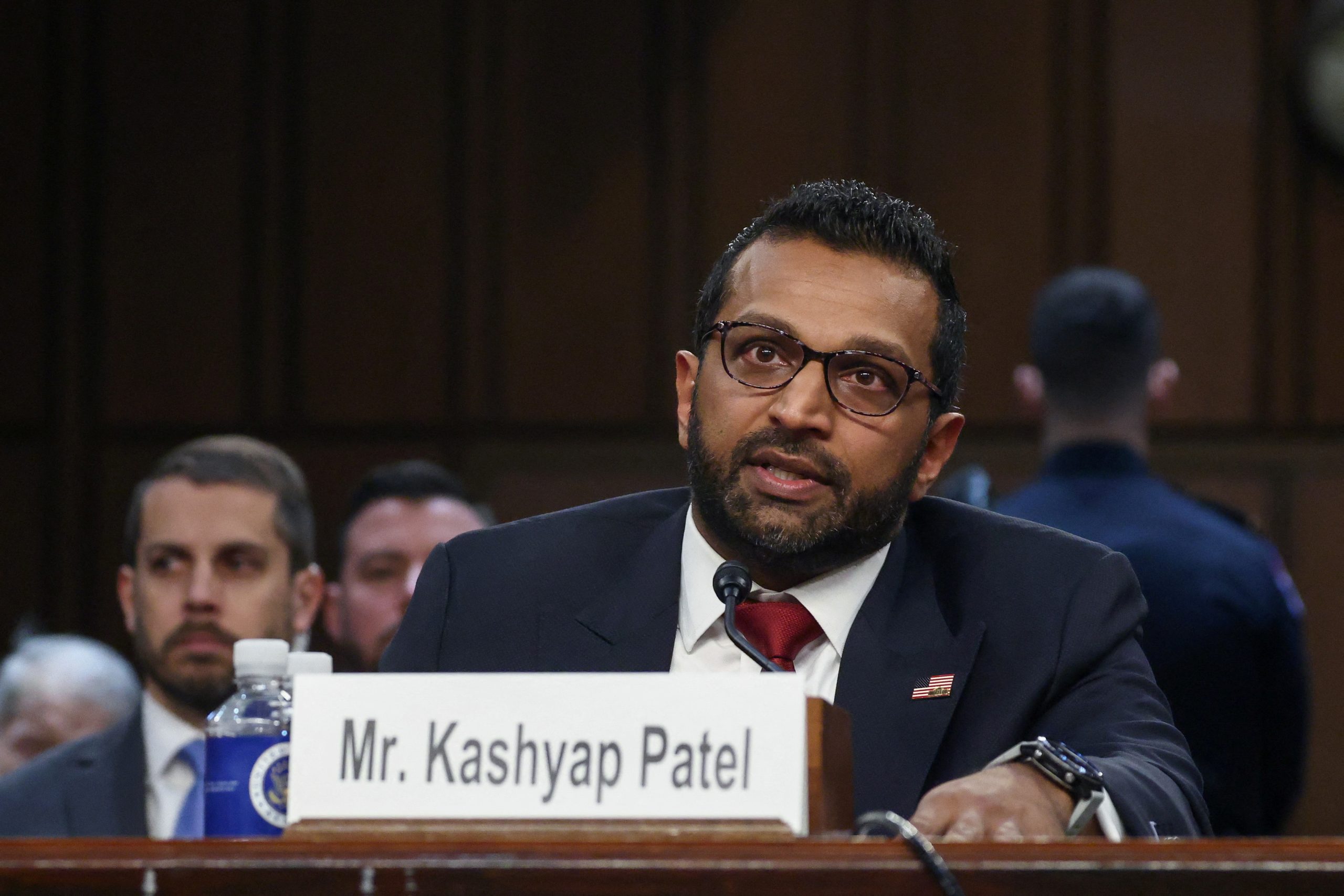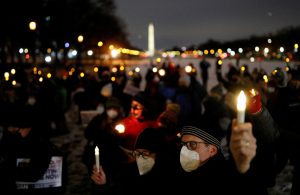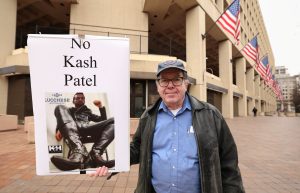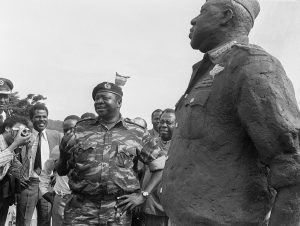- Thursday, April 03, 2025
While Republican argue Kash Patel would reform FBI, Democrats claim his past calls for retribution against Trump’s critics made him unfit to lead the law enforcement agency

By: India Weekly
THE Republican-controlled US Senate confirmed Kash Patel, President Donald Trump’s pick for FBI director, on Thursday (20), putting a Trump loyalist atop the nation’s most prominent law enforcement agency at a time of growing upheaval.
Patel was confirmed by a 51-49 vote. Two moderate Republicans, Senators Susan Collins of Maine and Lisa Murkowski of Alaska, joined all Democrats in opposing Patel, but it was not enough to overcome broad Republican support.
Collins and Murkowski, in opposing Patel, expressed concern about his past political advocacy for Trump and its potential effect on the FBI’s law enforcement activities.
Republican supporters argued he would reform an agency that has been hampered by a decline in public trust.
Democrats had forcefully opposed Patel’s nomination, saying his past calls for retribution against Trump’s critics made him unfit to lead the FBI.
“Patel will be a political and national security disaster,” Senator Dick Durbin, the top Democrat on the Senate Judiciary Committee, said in a statement.
Patel takes charge as Trump-backed officials seek to put their stamp on the FBI and its parent agency, the Justice Department, challenging decades-old traditions of independence and reorienting its mission toward Trump’s core priorities.
At least 75 career Justice Department lawyers and FBI officials, who normally keep their roles from administration to administration, have either resigned, been fired or stripped of their posts in the first month of the Trump administration.

Justice Department leadership has ordered broad policy changes, demanded loyalty to Trump’s agenda and sought to drop a corruption case against New York Mayor Eric Adams, a Democrat who courted Trump, citing his cooperation on immigration enforcement.
“Donald Trump himself and those around him have been very clear that they do believe that the president should affect prosecutorial decisions and prosecutorial outcomes,” said Noah Bookbinder, a former federal prosecutor and head of the ethics group Citizens for Responsibility and Ethics in Washington.
“They were offended by the efforts to prosecute Donald Trump and those close to him, and they see it as part of their mission to exact vengeance.”
Trump-appointed officials have said many early moves are aimed at pursuing the administration’s policy goals and ending what they have described as abuses against Trump and his supporters.
Trump and his allies planned during his campaign to install loyalists in the department and weaken the autonomy of a career workforce that they have long viewed with suspicion.
Trump has been ensnared in Justice Department investigations dating back to his first campaign in 2016 and faced two federal criminal cases during his years out of power which were dropped after he won the election before reaching trials.
“This DOJ will return to its core function of prosecuting dangerous criminals, not pursuing politically motivated witch hunts,” a senior official, Chad Mizelle, said in a statement last week. Department officials did not respond to a request for comment.
Prosecutors working on Trump cases repeatedly denied any political influence over those prosecutions.
Tradition of Independence
The Trump administration’s efforts have collided with a deeply ingrained tradition of independence in federal criminal investigations, dating back to reforms that followed the Watergate scandal that toppled President Richard Nixon in 1974.
The move by the acting deputy attorney general, Emil Bove, to drop the Adams case caused particular tumult. The top federal prosecutor in Manhattan, where the case was brought, and at least seven other prosecutors in New York and Washington resigned in protest, with some accusing the Trump administration of improper motives.
A top Justice Department official accused the prosecutors of having disordered priorities.

Trump-appointed officials also fired more than a dozen lawyers who were involved in the two criminal cases against Trump and about 18 prosecutors who handled cases arising from the Jan. 6, 2021 attack on the U.S. Capitol by Trump supporters.
The FBI faced internal strife even before Patel’s arrival. Bove demanded a list from the bureau of all employees who worked on the sprawling investigation into the attack on the Capitol for an internal review.
Its acting director, Brian Driscoll, a career FBI agent, initially resisted and law enforcement groups condemned what they viewed as an unfair attack on career agents who worked on investigations assigned to them. Two groups of FBI agents sued over fears agent names would be publicly released.
The Trump administration has said agents who only followed orders would not be disciplined and has committed, for now, not to identify FBI agents who worked on the January 6 probe.
Patel’s agenda
Patel has vowed that politics will play no role in his leadership of the FBI, but his closeness to Trump has prompted concerns from Democrats and many legal experts.
The top Democrat on the U.S. Senate Judiciary Committee, Dick Durbin, last week accused Patel of orchestrating the removal of FBI officials from the outside, citing information from whistleblowers.
Patel has said he will increase the FBI’s role in countering illegal immigration and violent crime, top Trump priorities, by “letting good cops be cops.” He has said he will scale back investigative work at the FBI’s Washington headquarters where many counterintelligence, national security and public corruption probes are housed.
Patel has been among the biggest boosters of claims that a “deep state” within the government has pursued Trump in an attempt to sink his political prospects.
“The erosion of trust is evident,” Patel wrote in a Wall Street Journal essay last month, referring to the FBI.
Patel’s nomination is itself evidence of Trump’s attempts to exert greater control over federal law enforcement. The FBI director, who serves a 10-year term, is not typically a role that turns over with the change to a new presidential administration.
Trump nominated Patel after winning the November election, effectively forcing former Director Christopher Wray, who Trump had appointed to the role in 2017, to resign. Trump fired Wray’s predecessor, James Comey.
Indian roots
The new FBI director traces his roots to Bhadran village in Gujarat’s Anand district, from where his family migrated to Uganda 70 to 80 years ago, his community members said on Friday (21).
Patel belongs to the Patidar community and its leaders claim that all his close family members are now settled in foreign countries.
They sold their ancestral houses in Bhadran once they shifted to Africa.
Chh Gam Patidar Mandal, an organisation of the community-based in Anand, maintains ‘vanshavali’ (family tree) of its members.
“In the ‘vanshavali’ we have names of Kash Patel’s father Pramod Patel and also his brothers and grandfather,” said Rajesh Patel, secretary of the organisation.
Rajesh Patel told PTI that though Kash Patel’s name was yet to be added to the family tree, entry of 18 generations of his family is there in the ‘vanshavali’ and it is stored in their office along with all members of their community.
“As per our records the family used to live in Moti Khadki area of Bhadran village and they migrated to Uganda some 70 to 80 years ago,” he said.

Rajesh Patel said as far as he knows, the family had returned for a brief time to India after their expulsion from Uganda in the 1970s.
“Those Indians who were expelled from Uganda had come to India for a brief stay as they had applied for asylum in the UK, US or Canada. Kash Patel’s family had also come here for a brief stopover and then moved to Canada once their applications were accepted,” he said.
From Canada, they shifted to the US, where Kash Patel was born in 1980, Rajesh Patel maintained.
Indians were expelled from Uganda by dictator Idi Amin who seized power in a military coup in 1971.
In 1972, he ordered the Indian community to leave his country in 90 days. (Agencies)